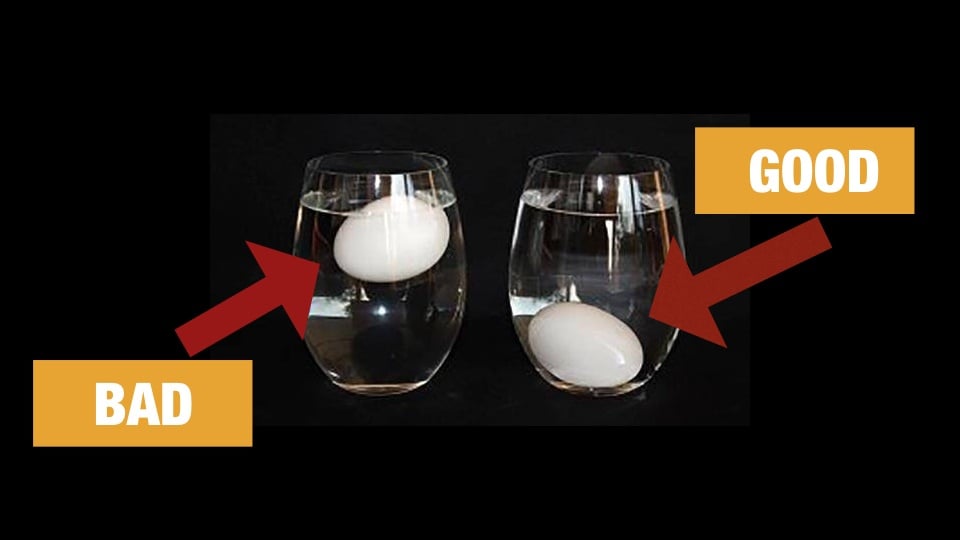You’re looking forward to cooking a meal with eggs. You made sure that all of the ingredients were in the house, but just as you are about to start cooking you start wondering if the eggs are still fresh.
After all, it is very difficult to tell if eggs are out of date or not. Eggs do some with a sell by date like most foods, but it is often arbitrary as it is very hard to predict when eggs will go off (unless, of course, you are a professional chef!)
This is because eggs don’t really change color or start to smell when they first go off, so they look totally normal to the unsuspecting eye. However, as soon as you crack a gone off egg you will know due to the horrible smell – and then you have a bowl of stinky, messy egg to clean up!
If you can relate to this don’t worry. It may be hard to know how to tell if an egg is good, but there is one fool proof way to check.
How To Tell If An Egg Is Good?
If you want to find out if an egg is fresh you should try the floating test to find out either way. Here’s what you need to do;
Step 1: Fill a big bowl with cold water, and make sure that the water is high enough for an egg to float in it.
Step 2: Gently put the first egg on the surface of the water. If the egg sinks to the bottom you can still eat it as it is fresh, but if it floats it has gone off and you should throw it away.
Step 3: Make sure to test all of the eggs that you want to use, as some eggs may have gone off and some may still be fresh.
What is the science behind this test?
This test is an effective way to test eggs as fresh eggs will always sink as there is no air inside the shell. However stale eggs do have air inside them as the liquid in the egg evaporates as time goes by, so the eggs float when they are in water.
If you test an egg and it sinks but it smells strange you should avoid eating it. The egg may be fine, but it isn’t worth the chance of you falling ill.
How Long Are Eggs Good For?
The FDA say that eggs tend to go off around four to five weeks after they were packaged, but this can fluctuate depending on where they are stored and the temperature. The use by date is a useful indicator, but it can be inaccurate so you can do the floating test to find out for sure if your eggs are fresh.
If you store your eggs in the refrigerator they should last longer than if you stored them in the cupboard as the temperature is lower.
How to Store Eggs If You Bought From The Store?
Purchased eggs need to be stored in a different way to eggs from your own chickens. For instance, purchased eggs should be left in their original container as it is specifically designed to keep the eggs fresh. It will also stop the eggs from absorbing scents and flavors from your fridge. If you keep your eggs in their original container in the fridge it is very likely that they will last past their sell by date.
How to Store Eggs If You Get Them Directly From Your Chickens?
If you collect eggs from your own chickens you should stop washing the eggs before you store them, as eggs have a natural coating that helps protect them from bacteria. If you wash this layer off the egg will be exposed and it will go off quicker. Simply put the eggs in a container and store them in the middle section of your fridge, rather than the side, as the middle is more temperature regulated.
What About Freezing Eggs? Is That Good?
You can also preserve your eggs for a long time by freezing them, but this method is slightly complex. This is because you can’t freeze eggs in their shells, but you can crack the eggs into a bowl to freeze, or you can beat them and then freeze them. You can also use an ice cube tray to freeze each egg individually!
You can also hard boil eggs and then freeze them, but the whites may become tough and chewy over time.
Featured photo credit: Pexels via pexels.com













































